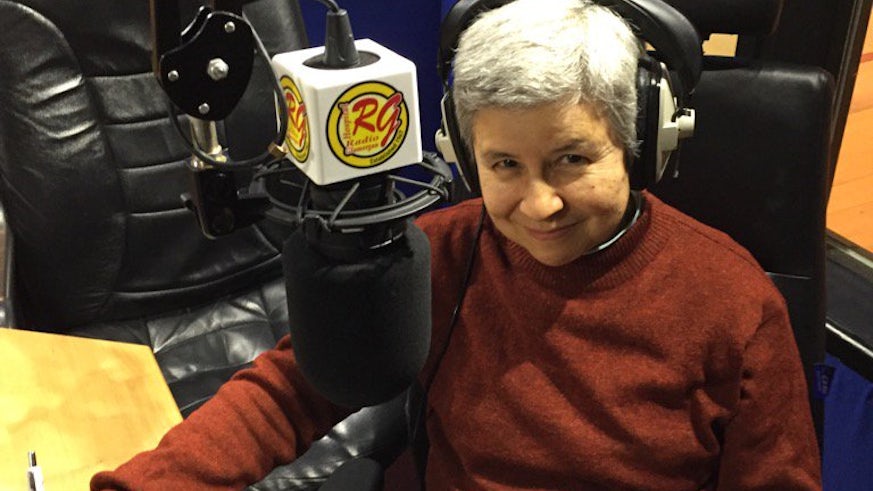World Diabetes Day 2016
14 Tachwedd 2016

Diabetes Research Group at Cardiff University marks World Diabetes Day on 14th November 2016.
Joining millions of people around the world to raise awareness of diabetes, the Diabetes Research Group led by Professors Susan Wong and Colin Dayan at the Systems Immunity Research Institute would like to share some of their ongoing initiatives, results and successes in Type 1 diabetes research. They describe some of the progress in basic science research into the causes of Type 1 diabetes and development of immunotherapy to prevent and treat type 1 diabetes. Prof Dayan has been appointed to lead the UK Type 1 diabetes prevention and treatment clinical studies group which will bring together patients, families and researchers to prioritise areas for study across the UK.
Type 1 diabetes is an autoimmune condition, which means the immune system attacks the insulin-producing cells of the pancreas, and damages them. The damaged cells of the pancreas are then unable to produce insulin to control the amount of glucose in the body. We know that people who get Type 1 diabetes have genes that make them more likely to become diabetic. However, this is not the only factor and that there are triggers for activation of the immune system in the environment. The immune cells that damage the pancreas include white blood cells called T cells. Our challenge is to understand why these events happen and how the immune system damages the pancreas, in order to develop therapy to switch off or control the damaging immune cells.
A link between gut microbes and type 1 diabetes

To study environmental triggers of the development of type 1 diabetes. For some years, we have been studying whether there is a link between bacteria living in the gut and Type 1 diabetes. For these studies, we have collaborated with Professor Li Wen at Yale University. This year, we have published two studies in this area.
In one of our studies, reported in the Journal of Immunology, we showed that in mice, by altering the gut bacteria of the mother, in a particular way using antibiotics during pregnancy, this could have a protective effect and prevent the babies from becoming diabetic.
In the other of our new studies, published in the Journal of Experimental Medicine, we have shown that a particular type of bacteria can trigger type 1 diabetes in mice. Our investigation showed that a small group of bacteria in the gut are able to directly activate killer T cells to attack and destroy insulin-producing beta cells in the pancreas. This work has been funded by the JDRF.
The challenge from this work will be to use these findings as signposts to discover how this relates to human Type 1 diabetes.
Killer T cells that recognize insulin as a target escape from control during their development.
Some of the killer cells that damage the insulin-producing cells recognize insulin as a target. We published two studies in mice, in the journal Diabetes, which showed that because of the particular way that the insulin is targeted by some killer cells, these insulin-targeting killer cells are able to escape from one of the normal control mechanisms when the T cells are developing in the thymus, the part of the body that educates T cells. The cells are released and circulate in the immune system. If the second line of controls that work once T cells are released are not efficient, these types of insulin-targeting killer cells can then get activated to damage the pancreas. This work has been funded by Diabetes UK and the MRC.
We are also developing with early basic science studies, a type of gene therapy that can specifically target these insulin-targeting killer cells that attack insulin-producing islet cells. This therapy uses healthy T cells that attract insulin-targeting killer cells by providing a “bait” and then when the cells are attracted by the “bait”, they are destroyed or controlled. This work has been funded by Diabetes UK, JDRF and the British Council.
Novel approaches to diabetes immunotherapy

In clinical studies, the Cardiff Diabetes Research Group is pioneering new approaches for halting the autoimmune process that results in the loss of insulin in Type 1 diabetes. We have just concluded the first study of proinsulin peptide therapy in adults with newly-diagnosed type 1 diabetes. This was a multicenter study of 27 patients with £600,000 of funding from USA and Australia, which showed that this approach is very safe and provided the first evidence that patients treated in this way need lower doses of insulin to achieve the same level of glucose control. More recently, we have had €6m of European Union funding to study the potential of tiny gold nanoparticles linked to proinsulin peptides to switch of the immune response. And on Nov 9th 2016 the first ever dose of this treatment was given to a young man with type 1 diabetes in Cardiff. This first-in-man study will complete in May 2017. We have also developed this use of very short (0.5mm) “microneedles” coated with proinsulin peptide to counteract the immune response, and the first clinical studies of these will commence in 2017 with funding from the JDRF, USA.
Leading clinical trials in the UK
Clinical studies requires patients to volunteer. Cardiff now leads the clinical recruitment arm of the UK Type 1 diabetes Immunotherapy Consortium launched in 2015, funded by Diabetes UK coordinating 15 research centres across the UK performing trials in adults and children.
Our website was launched on 14th Nov 2016 – www.type1diabetesresearch.org.uk
Rhannu’r stori hon
Our systems biology-based research informs the development of novel diagnostics, therapies and vaccines against some of the greatest public health threats of our time.
